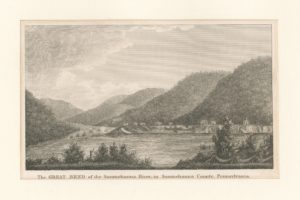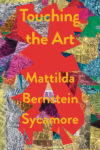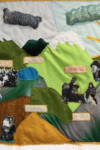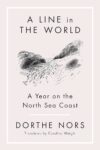
Potomac
On January 13th, 1982, the water moved under ice, and my father drove along the river, and Larry Wheaton captained a near-frozen plane toward the runway of what would later become Reagan National Airport. Minutes later, the plane’s tail section chunked off a solid piece of the 14th Street Bridge a few miles from the White House, and the plane careened into the ice, pillowing for a moment before breaking through and drowning. There was snow falling and if no plane had descended from the sky, there would have been a kind of quiet like a dream. A sort of hush that comes when nature stills the world that moves through it, and people go about their days in the softness of a dream, snow caught on an eyelash before melting, a tear.
People gathered on the broken bridge and by the river’s edge to watch seventy other people die. There was nothing to do, really. The ice was thick and the water was cold. My father’s beard was black then, and heavy with that moment that comes before a person begins to call himself old. A man named Lenny Skutnik jumped into the frigid water to save a woman. All of this was captured on tape. The splash of his plunging, the ice braiding round her strands of hair, her numb flailing in the moments before what would have been her death. Another man named Arland Williams, who had been in the plane, kept passing the lifesavers, the ropes, to the people drowning next to him. At some point, he knew, I’m sure, that all of this passing would lead to his. And it did. He went under and never returned. When they fished his body out, it was blue, and I imagine someone chipping it with a hammer and all of him, skin and organ and bone, shattering like glass.
In an essay for TIME, Roger Rosenblatt said of Williams, “For a while he was Everyman, and thus proof that no man is ordinary.”
Just northwest from the crash site, after the river bends and deepens from Virginia, sit three islands, colloquially known as the Three Sisters. One legend, perhaps my favorite of the few, tells of three Native American daughters who were left, each to a rock, after refusing to marry the men their father had chosen for them. They cursed the spot. Or, in the story, there were no rocks, and they became them. The currents rage past this place — they twist and turn, have caused men to drown and die. Centuries ago, the Atlantic Ocean reached these women and called them its shore. In the years since, out of fear or the work of men, it has receded, and they remain marooned, without even a glimpse of the serene eternal distance that an ocean provides. Sometimes when I am back home, my father drops me off along the water’s edge, and I run ten miles out and ten miles back along the dirt and cinder towpath that softens beside the river. I run past the Three Sisters and hold my breath and think of drowning, and then under bridges and over little inlets and past men fishing with long rods descending toward the water. I think of how something can exist for so long and how little knowledge we can have of it and how it can manage to curve so gently and sit so pretty under starlight and be, sometimes, so calm and so still.
There is some controversy about what the name Potomac means, in its original Algonquian. I prefer the simple “something brought.” My father left his mother and another river to bring his something to the Potomac. He lived alongside many other rivers before then. The Mississippi, the Charles, the Susquehanna, dried-up Texas creek beds, whatever inching desert trickle makes its way through California dust. I don’t know what he thought of when a plane fell through the white-flecked sky and into the water, or if he ever missed his mother, or if he knew that seven years later he would have a son, and two years later, another one, and that nearly a decade after that he would take the two of us to the river when it flooded and let me wade ankle-deep then knee into it, the streetlights swimming in the shallows, and him holding my hand before letting go, all this water breaking its borders to say hello, and us not knowing edge from ocean, sand from beach. By morning, it had receded, and the river was river once more, and we called one another by familiar names, father as father, brother as brother, son as son. I know now how much water we are, and how we have skin and organ to keep it in place so we don’t come pouring out. Sometimes I wish we did, into one another.
In his essay, Rosenblatt wrote, “The man in the water . . . could hand life over to a stranger, and that is a power of nature too.”
There is a man in the Potomac and there are three sisters frozen forever and there is my father, sometimes, as I see him now, driving in the springtime, gloves on his hands to keep the near-cancer from spreading under sun, windows down, and all that water, and some days I long for him to drive into it and let it overwhelm him of breath and I will not even be sad, no, I will take my time journeying back down to the place I called home and I will lace up my shoes for a run and I will watch the water become the sun and then the moon and stars and then I will take my shirt off to cool my body down and I will wade into it and I will be with my father as my father is with so many others as we are all, each of us, with so many others, in this water, together.
Susquehanna
In the late eighteenth century, the English poets Samuel Coleridge and Robert Southey harbored plans to begin a utopia across the Atlantic, on the banks of the Susquehanna River. They married two sisters — though some reports say three — and dreamed of a life spent reaping the rewards of relatively untouched farmland, a place of wonder, as all accounts described, where one could live comfortably on just a few hours of work a day. The plans died out quickly, and Coleridge’s pantisocracy floated on into space, a dust mite of history, and the sisters probably wished they had married better men, men whose beards and skin were not the color of paper, who did not think they could learn how to farm or figure some mastery over wood in the small span of a winter. Though perhaps the greatest tragedy is that the sisters never saw the Susquehanna.
If you are in a car driving up 15 through Pennsylvania on your way to your grandmother’s, your father will decide, after passing Sunbury, to veer off the main road and take the scenic route through Northumberland, a town of a few thousand, a town of porches and gas stations and that one Italian restaurant too big to ever be full. You will cross a bridge where two river twins join to become one, and you will see to your right this beautiful merging, the valley widening to admit the blood of kin. And if you could, possibly, strain your neck out the car window and along the water, through tall grass and astride concrete that separates what man built from what man built upon, you will see the Susquehanna as it bends and snakes and winds back from where you came. You won’t know yet what it means to be still. You will be young and restless and in the backseat of a car, feet up on your brother’s sleeping shoulders, breath fogging up the glass, your father sometimes reaching back without looking to pluck a hair from your leg. But you will learn. You will make many trips and cross this bridge, in your lifetime, dozens of times, each moment pressing nose to glass to witness what you cannot give a name. Sometimes you will wonder if the water even moves, it looks so quiet. And then you will wonder how. How, surrounded by such movement, the shrill hiss of tires, the static on the radio, the voices traveling invisible over and around its body — how this thing, quite simply, is. And is so lovely.
It takes a river to know a body. At its pouring out, and its most giving, the Susquehanna is the summation of so much. It is not just Susquehanna, not simply twin sisters of North and West Branch. It is Unadilla and Chenango and Chemung and Lackawanna and Juniata and Swatara and Octoraro. It is a family of water emptying into another body that is the blood of so many families filled over so much time. It is curve of sickle and ridge of teeth. It is marrow warming up a bone. It is coal ash of skin caught sinking into bed. It is ruffled bedspread, pillowed sheets, the impression of someone you loved filling up first with air, then water, then you. The place where the Susquehanna meets the Chesapeake, one life pouring into another, is called Havre de Grace, or Haven of Grace. Because grace is elegance. Because elegance is beauty. Because beauty is an overcoming. Because there is beauty in overcoming. Because overcoming is journey and because journey is hard and because what is hard is fighting and what is fighting is violent and what is violent is, simply, pushing toward some sort of power, and because there is power in water and because water allows light to move through it, and sound, too, and because all of this living is a kind of light and sound and because all of this light and sound gives us some hope in coping with the knowledge that living is a kind of violence and because violence is, simply, pushing toward some sort of power, and because power is water and water, unless held by land or man, is moving, and because movement is journey and because journey is overcoming and because overcoming is beauty and because in beauty, there is elegance, and in elegance, grace, then yes, let us call this river’s pouring out a haven of such a thing.
The sisters never came, but the miners did. And to they who never asked, the river said no. In 1959, between the Pennsylvania towns of Pittson and Wilkes-Barre, miners working for the Knox Coal Company drilled upwards from underground, into the river’s bed. Whatever earth lingered between their heads and the river’s bottom did not hold under the weight of water, and the Susquehanna came crushing in, inundating the mineshaft, killing 12. The report that followed, published by the United States Department of the Interior, labeled the cause of the disaster as “the swollen, ice-laden river.” That poor thing. To have a bed burrowed under by strangers. To be so haunted in its sleep. To be so heavy in this earth. To be affected by other people’s living. To be the cause. Years later, Edward Hanlon wrote that the disaster “ensured . . . for better or worse, men would no longer descend into pits.” But they did, and they still do.
Thirty miles east of Northumberland, where the two twin sisters of the Susquehanna meet to become one, is a mining town named Centralia. Seven people live there now, doomed to die by age or poison. Underneath it, a fire burns, has been burning for five decades, will continue to burn, by some estimates, for centuries. No one knows truly why the fire began, if it was a result of a landfill burning or another fire along a coal seam. But it was the river that brought people to this town, and the river that remains. Where there used to be over two thousand, there are now seven, who took the government’s money and now wait to die. I do not know what they do. There is no place to hold a job, no place to sit while someone fries an egg. There are more people buried in cemeteries long forgotten and abandoned in the ruins round the town than there are people living in houses. The highway ends in Centralia. It stops abruptly, becomes a mix of stump and dirt and ash. Even the zip code has been disbanded. If you journey West, you will find the Susquehanna, though. If you journey North, too, or South. And if you journey East, eventually you will come to the ocean, and if you cup your palms and grace them through the water and bend your face to meet the water and use your tongue to lap the water, you will taste, after salt and stone and seaweed, the blood of the Susquehanna, and in that blood, the blood of Unadilla and Chenango and Chemung and Lackawanna and Juniata and Swatara and Octoraro.
What I mean is: It takes a river to know a body. Hush. Listen for the others swimming through your water.
Genesee
On November 6th, 1829, the “Yankee Jumper” Sam Patch stood nearly 100 feet above the water of the Genesee River at the top of Rochester’s High Falls, holding a pet bear. He threw the pet bear into the water, and the bear survived. Sam Patch followed, and survived. Thousands of people gathered by the Genesee’s shores to watch, and Sam Patch deemed them not enough. So he built a platform, and jumped again from a higher height. This time, the bear would follow him. It was now Friday, November 13th, and it drizzled, and Sam Patch stood 125 feet in the air in his underwear. He reportedly said something about Napoleon not being able to “jump Genesee Falls,” but his utterings were lost in wind and breeze and frozen air. He jumped and never came back up. They found his body frozen in ice upriver months later, when the spring came to thaw out winter’s frost. The bear. No one knows what happened to the bear.
In his novel Redburn, Melville wrote, “I looked like a Sam Patch, shambling round the deck in my rags.”
From my late grandmother’s house, you can see the Genesee flowing north to meet Lake Ontario. There is a lighthouse blinking red at the end of a long pier. The lake is almost always a softened mess of blues and greys, birds circling forever above its water. When my mother still lived with my father and came with us to Rochester, she would take me out to the river’s mouth, by the motorcycle bars and second-rate mob joints and dives, and we would sit with feet hanging over the edge that separated land from water and throw chunks of bread into the Genesee. The birds that circled above swooped down and fed on these flour boats. Some landed on my mother or by my fingers. My mother smiled and we would sit there in the twillish herringbone grey of what usually was winter, her short hair flecking the space between her eyes, the two of us not talking, not needing to. If you ever tell my story, say this was when I learned to listen.
Sometimes I look like a Sam Patch. One night, not long after my grandmother died, I bought a few tallboys of Genesee from the bodega round the corner and sat on the deck outside my apartment and pretended I was drinking her blood. I was wearing old sweatpants and a shirt I hadn’t washed in weeks and a sweater I hadn’t washed in a year over all that dirtiness. I did not want to bring her back — I only wanted to be with her a little while longer, to feel a kind of closeness simple closeness can’t provide. She did not come down to say hello, no, and I hung up my call to my father before it finished ringing, and I left one tallboy only half-finished, and the Genesee is one of the few rivers in America that flows north, and the beer named after it tastes like a rusted metallic rendition of a carrot run through a blender and mixed with sweat and lake water, and Sam Patch before he died said, “Some things can be done as well as others,” and I think of this often and wonder if it’s true, some things, like a river flowing north, or a body falling through the air, or a plane descending from the clouds, or a marriage, or, simply, dying, or loving, or failing at it all.
Once, before she died, my grandmother told me, “Devin, make your father’s job easier. His job is hard. And he’s doing so good at it.”
Certain things bend against the grain of normal expectation. A river flowing north. A body falling from the sky. A plane descending from the clouds. A marriage. When my father came home from work after my mother left, late, holding a bag of fast food for us to eat together while we watched a baseball game on television, he was a kind of river flowing north. When my father put on sweatpants and took a nap and told me to wake him up by jumping on his body in the bed, he was a kind of river flowing north. When my father slept with one eye closed on the long drive toward his mother’s, he was a kind of river flowing north. When my father dies, both eyes pushed closed, his beard trimmed back to a centimeter, the greys dashed with salty white, he will flow forever north, a river.
The last thing my grandmother did to me before she died was hold herself, lighter and weaker than ever, but still magnetically strong, to my body, her volcanic ash of near-century-old skin smelling of violets, her head near my bellybutton. To let your hand be run over by a river, to feel in that running a kind of quiet age no human can ever provide — this was what it was like to be held by her. It was a kind of forever for which I have no words, only water.
A local paper, upon the news of Sam Patch’s death, called his act “a daring and useless exposure of human life.” If he had survived, it might have been a miracle, like Auden wrote, a human falling from the sky, only to land in frigid water and lift a head to breathe, and live. A kind of Icarus inverted, under cloudy skies. What is certain, though, is that something went wrong in his falling, a body twisted by time and space in that gap of air that breathed between his heart and the river. What we cannot take back. What we wish we could. That same local paper wrote, “The waters, troubled a moment in swallowing their victim, are at rest.” The Genesee still flows north, quietly, without circumstance, before emptying into Lake Ontario. It resumes. After Sam Patch fell and died, people waited for a few minutes, an hour at most, to see if his head would somehow rise back into the world, but it didn’t, and they went home, and whatever could’ve been a miracle that day — a man falling through the air, a plane descending from the clouds, a marriage — wasn’t. And the city hummed again, and the river still powered the mills, and the people went to work in gloved hands and hats, and in the winter the ice formed, and in that ice months later, someone found a body, and by that time, most people had forgotten about what could’ve been. And there was no ceremony. 114 years later, my father was born. 185 years later, his mother died. 186 years later, a river still flows north.
Hudson
On January 15th, 2009, US Airways Flight 1549 flew through a pack of geese, causing both engines to fail. The plane had only been airborne for several minutes, and Captain Chelsey Sullenberger glided the broken craft a few hundred feet over the George Washington Bridge and into the Hudson River. The metal crashed against the water, but did not bounce and crash again. All passengers survived.
The slang idiom up the river, dating back to the nineteenth century, refers to Sing Sing Prison, as it was (and still is) up the Hudson River from New York City. Think up the river as a place to go and die. Think up the river as no longer joyful, or even full of nature. Think up the river as end of life.
Most mornings and evenings I run along the Hudson. In the mornings, my bones still creak in their waking, and my body feels always at the point of breaking. I run toward the bridge and then away, watching the water’s waves to gauge the wind. I prefer evening, when the bridge is its own twilight against the sky, and my body’s shadow runs along with me as I fall and glide under lamps. In dark, a river holds the sky’s shadow, cups the night in water, keeps it safe and reachable. Running alongside the Hudson is like running alongside a procession of ghosts. Those I’ve loved and those I’ve forgotten, those dead and those living. It is a church.
The Hudson, by popular convention, begins on a ridge of Mount Marcy, sprung from a tarn called Lake Tear of the Clouds, a mirrored pool of water you could hurl a baseball across. The river starts as a simple stream, something that glitters rock, trickling downward from its beginnings closer to oblivion. It meets the Mohawk near Schenectady and becomes a tidal estuary as it flows south, into the Atlantic, gathering more and more salt along the way. Sometimes saltwater bass or shark venture deep into New York City’s border, thinking the river a kind of ocean. The name Spuyten Duyvil, given to a neighborhood in the Bronx, is Dutch for “spouting devil.” In the 1640s, a Dutch man, Anthony Van Corlear, attempted to swim across the Hudson at night. He held a trumpet. According to Diedrich Knickerbocker’s account, Van Corlear said he would “swim across in spite of the devil,” and he swigged from a bottle of whiskey and made the attempt. A shark took him under water, but not before Van Corlear could summon a blast from his trumpet. The whims of man — to conquer nature, seize and hold power, feel the thrill of dying without its consequence — succeed all too often. It is when they fail that they should be remembered. They do not fail enough. They should fail more.
When Captain Sullenberger crash-landed his plane into the Hudson, he purposefully set it down close to ports to allow for a quicker response. The river was not frozen, and it took less work to save the 155 passengers on board than it did to rescue the dead detritus of the leftover metal from the river’s bottom. Captain Sullenberger was a glider, and understood the whims of wind and water, how, suspended in the air, he was merely a tool consistently at the earth’s disposal. He understood the properties of water, how, when struck at certain speeds, it becomes as brutal as steel, a killer. He did not attempt to conquer anything that day — he only attempted to rest easy into it.
The Hudson is technically a drowned river, meaning years upon years ago, it was once a valley. Now it is drowned by river and ocean. Think of a home built with wood and stone in the shadow of the fjords that decorate the Hudson’s permanence. Think of a family striking thick the richness of soil, and the garden bending toward the light blitzing over the horizon. Think of how it must feel to lose everything you’ve ever worked for to the showy unpredictability of a nature growing over the millennia. No one is ever safe.
My first marathon, my father drove me up the river to Schenectady. It was almost-autumn, and the leaves embroidered the sky like a rich firmament of soil upturned and dried, left hanging on clothesline branches for the sun to shine upon. The marathon ran alongside the Mohawk until it met the Hudson, and then into Albany. I began too fast, clicked off my first mile under six minutes, my second, too, and, as the route met the river, felt one with myself, too assured of something beautiful. But along the Hudson, I fell apart. At mile 19, I felt my legs go numb and heavy, as if they had a lover and lost her. At mile 21, I stopped and dry-heaved on the side of the road. At mile 23, a fellow runner tapped me on the shoulder and, without speaking, beckoned me to tag behind him. When I dropped off, collapsed from a run to a walk, he didn’t even say goodbye. Beside me, the river flowed in the same direction at a faster speed. It was always, would always, and will always get there first.
Think up the river as a kind of forever-loss. Think up the river as moving too much and too fast and too far against nature. Think up the river as a missed kiss, your tongue slipping back inside your mouth at the moment she opens hers. Think up the river as a forever-wrong, to be going back toward the source, the tear the sky cried, the sorrow pool, the want.
Once, I sat with a girl on a deck outside a lighthouse that extended into the middle of the Hudson. There was very little around, no longer the peek-peek-peeking of the needled buildings in New York City distance. Birds circled like they do. Sometimes a train bent snaking round the river’s edge, gracing long the water. We were tired and did not talk much and it was that almost kind of cold, where the chill comes from a distance with the wind, reminding you of a not-so-distant future when it will simply sit there with you, and ice your bones. Sometimes I caught her eyes watching me watch the water, and I think we were trying to figure out, through a silence, a tide gathering before receding, if we were in love. I don’t know many things for certain. I think that is the trouble with being human. But to write, to love, to live is an act of distilling. From the Latin, distillare, or, “to trickle down in small drops.” Miles before the lighthouse, a small tear flecked from sky became a pond, which became a creek, a stream, which drowned a once-was-valley. And it was there now, slowly humming toward an oblivion of ocean — water’s heaven. Her hair sometimes sunshined her eyes in the breeze, though most sun hid behind the filmy lather of clouds, and she watched me throw one rock into the water, and then another, and another, and then we left the river and walked away and talked or did not talk or spoke just enough to let our in-betweens gather between us like their own rivers, and I would be lying if I said to be human is to be a river, because there is certainty in that, and direction, and kind of gravity and grace. But to be human is to want. And if you want to be a river, and I want to be a river, then there is a prayer where we can flow into the same ocean.
Sometimes the birds flew close to the water, and skimmed it with their wings. Sometimes their feathers seemed the same whiteness as the tip of a wave, and there was oneness there.
To think: a plane falling from the sky, and landing like a bird.
Devin Kelly earned his MFA from Sarah Lawrence College and co-hosts the Dead Rabbits Reading Series in New York City. He is the author of the collaborative chapbook with Melissa Smyth, This Cup of Absence (Anchor & Plume) and the forthcoming books, Blood on Blood (Unknown Press), and In This Quiet Church of Night, I Say Amen (ELJ Publications). He has been nominated for both the Pushcart and Best of the Net Prizes. He works as a college advisor in Queens, teaches at the City College of New York, and lives in Harlem. You can find him on twitter @themoneyiowe.
This post may contain affiliate links.







